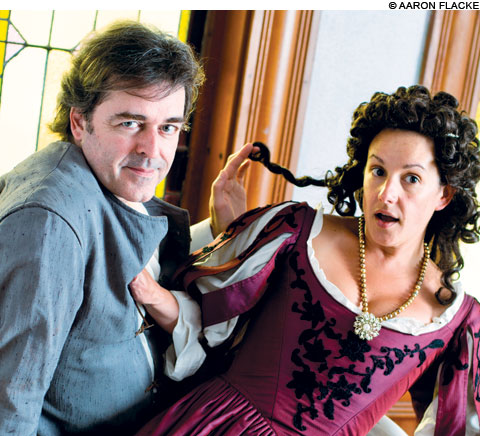
POSING IS A CHALLENGE Molière's Tartuffe satirizes piety. |
Religious hypocrisy has been one of the lowest-hanging fruits for satire in the last few years: Think of those fervid denouncers of homosexual acts, like New Life Church pastor Ted Haggard, who were discovered to be clandestinely engaging in those very acts (in Haggard's case, with a hired masseur and under the influence of crystal meth). But religious hypocrisy is certainly nothing new, and we have a monumental critique of it in the 1664 farce Tartuffe, by the founder of modern social satire, the 17th-century French playwright Molière. This ageless comedy is onstage now at the Theater at Monmouth, in repertory, under the direction of Matthew Arbour.
The title character (James Hoban) is an obsequious, sanctimonious hanger-on in the household of Orgon (Mark S. Cartier), who is dazzled to blindness by the purported piousness of a man who "can detect a mortal sin where you would least expect it" — offenses include plunging necklines, ribbons, and "killing a flea too wrathfully." Orgon's wife Elmire (Brooke Edwards) and the rest of the house, especially the maid Dorine (Janis Stevens), see through Tartuffe's act and are vexed by his influence — particularly as it threatens the engagement of Orgon's daughter Mariane (Olivia Dustman) with her love Valère (Camden Brown) — and Elmire has herself been suffering Tartuffe's advances. Elmire's brother Cléante (Thomas Anthony Quinn) urges Orgon to be rational, reminding him that "those whose hearts are truly pure and lowly don't make a flashy show of being holy." But Orgon will only be swayed by catching the imposter in the act, in Molière's monument of a farce, written entirely in rhymed couplets and with a masterful eye for the human comedy.
Seventeenth-century arts held classicism in high esteem — the unities of time, place, and action, and the rule of balance in composition — and in both set design and blocking, Arbour's production celebrates these qualities. The harmonious set (designed by Michael Minahan) glimmers in ivory and gold-leaf stencils, with four period paintings of naked women reposing among bedclothes. As the wigged and period-garbed characters move through the room, they maintain an elegant symmetry, one actor moving upstage as a counterpart moves down, visually conjuring the sense of ordered reason that Orgon's family hopes will prevail in him and remove Tartuffe from their lives.
It's hard going, to make Cartier's beautifully tetchy, peremptory, prideful Orgon see reason. Cartier also brings fine nuance to the role, letting us see him moved by his daughter's pleas even as his foolish pride keeps him from relieving her. As his foil, the excellent Quinn gives brother-in-law Cléante an easy affability and a touch of rogue as he tries to reach Orgon. The unflappable Elmire has, like her brother, a matter-of-fact tolerance, a practical sense of sensuality, and an instinctive kindness, all of which come through radiantly in Edwards's fine performance, and which are set off nicely by the snarky impatience of Stevens's Dorine.